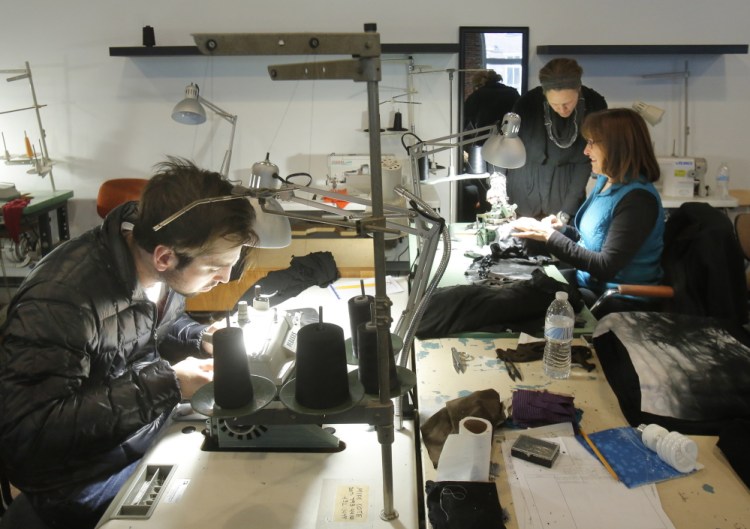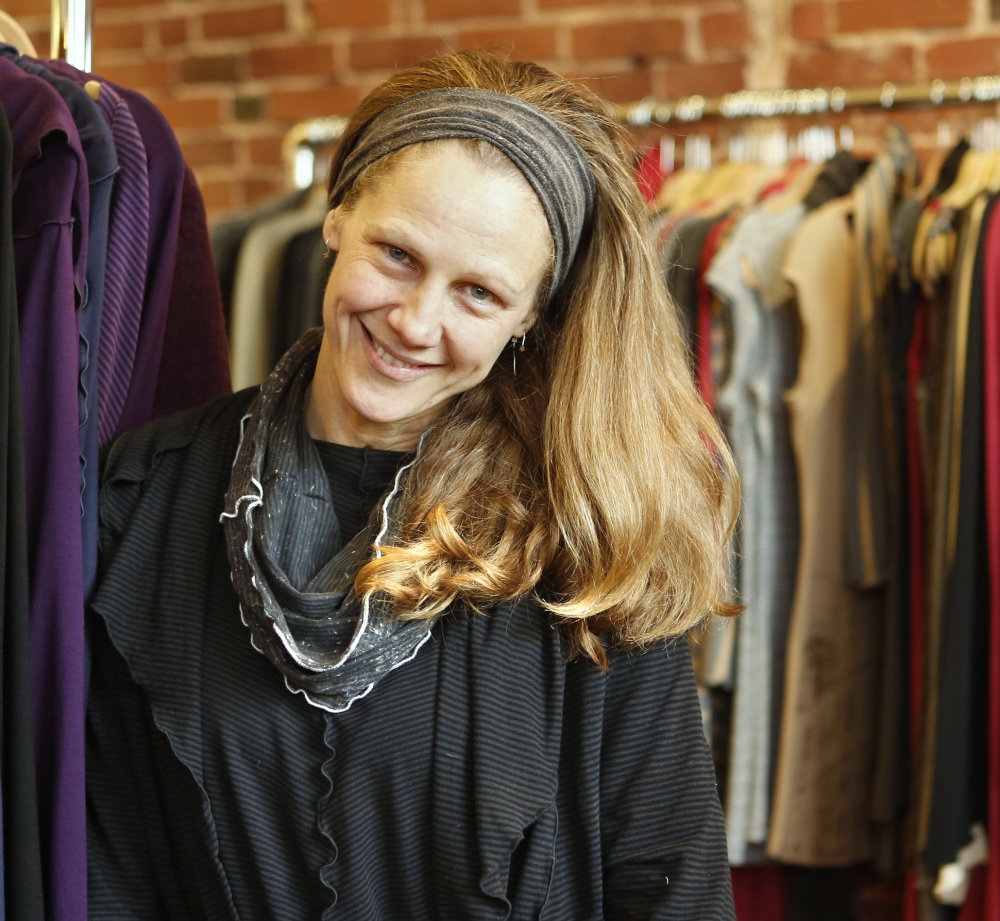BIDDEFORD — Clothing designer Roxi Suger spends much of her time focused on designing and growing her clothing line.
As she walks through her new production space in a Biddeford mill, however, she’s also keenly aware of the history that surrounds her.
“You feel it in the air. It’s steeped in that New England manufacturing tradition,” she said. “You can feel a little of the sorrow, but also the hope and energy of creating in this space.”
Suger, owner of the Angelrox clothing line sold in boutiques across the country, is shifting all of her manufacturing from New York into the Pepperell Center, continuing Biddeford’s legacy of textile manufacturing on the banks of the Saco River. The move into the former Pepperell Manufacturing Co. mill comes a year after she opened Suger, a retail boutique on nearby Alfred Street.
The company has 10 employees now and plans to grow in its new home.
Suger’s decision to relocate her business to Biddeford is praised by city leaders as another sign that the redevelopment of the downtown and mill districts is well underway. The 5,000-square-foot Angelrox production space is in the Pepperell Center, part of the sprawling Pepperell Mill Campus that now includes a mix of apartments, studios, light manufacturing and restaurants. The clothing manufacturing space is between Hyperlite Mountain Gear and a spot currently being converted for a new Portland Pie Co. restaurant.
“They are just the right kind of folks for downtown Biddeford because they really honor and cherish the history and where we came from,” Heart of Biddeford executive director Delilah Poupore said of Suger and her husband, Julian Schlaver. “They want to continue that history. They have the kind of can-do, entrepreneurial spirit needed for a city in this stage of development.”
Textile manufacturing in Maine — and the Biddeford-Saco area in particular — extends back to 1825, when Saco Manufacturing built the largest textile mill in the country. By the post-Civil War era, large textile manufactures were operating in massive mill complexes in Biddeford-Saco, Lewiston-Auburn, Waterville and Brunswick. Soon afterward, small-scale mills popped up in rural communities, said Maine State Historian Earle Shettleworth.
For about 100 years, textile manufacturing was a major industry in Maine, employing first workers from rural areas and later immigrants from Canada and Europe. When air conditioning was invented in the 1950s, manufacturing shifted to Southern states, closer to the cotton source, Shettleworth said.
“That, of course, devastated many of the communities where there had been textile industries for years,” he said.
Now mill complexes in many of those communities are being redeveloped for other uses. The energy around redevelopment and availability of mill space in Biddeford caught the attention of Suger as she thought about strategically growing her business.
“We’re inspired by all the people here who have had such vision,” Suger said.
Suger and Schlaver moved their business from Brooklyn, N.Y., to Biddeford a year ago as part of their plan to grow the clothing line. Suger, who previously taught at Parsons The New School for Design in New York, launched her women’s clothing line in 1999.
Angelrox produces at least 50,000 pieces — including dresses, wraps and headbands — each year. The line is sold in about 300 stores nationwide, including a handful along the Maine coast. Suger declined to talk about her company’s revenue, but said the charitable component of her business has raised about $30,000 for Biddeford charities in the past year.
Though their first step in Biddeford was to open the boutique — with some space for production — the plan always included carving out a larger space in the mill. The production space is housed in the former Building 13, where looms once stretched the entire length of the 400-foot building. Now reams of cloth, long work tables and sewing machines occupy most of Suger’s space.
Suger said her move to Biddeford allowed her to hire employees who already are trained for manufacturing jobs. Suger and Schlaver employ about 10 people and plan to hire more as they settle into their new space.
“We needed space in which to grow and good people to help us grow,” Suger said. “We’re finding there’s a wealth of good stitchers here. They are hardworking and have great spirits.”
Doug Sanford, owner of the Pepperell Mill Campus, said it’s “great to continue textile manufacturing” in the mills, but equally impressive that Suger and Schlaver have immersed themselves in the community. They recently organized the Biddeford Ball, which raised about $20,000 for local charities and brought hundreds of people into the mill.
Suger said that support for her business and charitable efforts has made the transition to Biddeford easier than she might have imagined.
“It feels a little fairytale-ish sometimes,” she said.
Send questions/comments to the editors.





Success. Please wait for the page to reload. If the page does not reload within 5 seconds, please refresh the page.
Enter your email and password to access comments.
Hi, to comment on stories you must . This profile is in addition to your subscription and website login.
Already have a commenting profile? .
Invalid username/password.
Please check your email to confirm and complete your registration.
Only subscribers are eligible to post comments. Please subscribe or login first for digital access. Here’s why.
Use the form below to reset your password. When you've submitted your account email, we will send an email with a reset code.